Does Participating in Sports Build Character in Children?

“Sport teaches you character. It teaches you to play by the rules; it teaches you to know what it feels like to win and lose. It teaches you about life.” -Billie Jean King
And with 39 grand slam titles to her name, former world #1 tennis player, Billie Jean King, should know a thing or two about the lessons learned on the sports field and does participating in sports build character! But not everyone agrees with her. While well-meaning parents across the globe enroll their children in sports programs to boost their health and fitness, help them socialize in a positive environment and build character, experts say that the latter outcome is not a given.

Although participation in sports certainly can help develop positive character traits in children, some experts feel that this can and will only happen when key role players (like coaches, teachers and parents) make a conscious decision to make character development an objective of the sport experience.
What is a character?
So what exactly is “character”? Does participate in sports build character in children? What are the traits that we as parents want our children to develop on the sports field? In their book Character development and physical activity, David Shields and Brenda Bredemeier describe character within a sporting context as a combination of the following qualities: Compassion, fairness, integrity, and sportsmanship. Joseph Doty, on the other hand, defines character as “behaviors that show respect and integrity in a sport setting” in an article published in the Journal of College & Character in 2006.

And while these certainly are admirable virtues to want for our children, parents will be disappointed to learn that exactly the opposite is often picked up on the sports field.
Negative traits can also be picked up on the sports field
Through surveying a total of 5,275 high school students from around the US in 2006, a team from the Josephson Institute Center for Sports Ethics made the following worrying finds:
- Two-fifths of the boys included in the survey, as well as a fourth of the girls, didn’t see any problem with using a stolen playbook if received anonymously from a supporter before a big game.
- 30% of all boys included in the survey, as well as 20% of the young female softball players, questioned, do not think that it is wrong for a softball pitcher to throw at a batter deliberately if the batter had hit a home run the last time he or she was up.
- Of all the students questioned, 54% of male football players, 49% of male basketball players, and 18% of female participants in all sports approved of ‘trash-talking’.
- Just over a third of all the boys questioned, and 12% of all the girls questioned, approved of their coach swearing at officials in order to get themselves thrown out of a game in order to get the team ‘pumped up’.
Authors of another study published in The Sport Journal in 2004 looked at the impact of sport participation on the moral and social character of 370 college athletes vs. 225 non-athletes. The results of the study showed that the non-athletes scored significantly higher on the moral character index than the athletes.
Interestingly enough, athletes participating in individual sports also scored higher on the moral index than team sports players. The authors of the study reckon that this finding might have to do with the socialization process in the team sports milieu. “… many team sport athletes learn that winning takes precedence over the moral ideal”, they added.

And while these are just the findings of two studies, new examples of displays of poor character in sports pop up every day. Just open a newspaper or watch the evening news and you’re sure to come across at least one example of an athlete or team who did not conduct themselves in a manner marked by respect and integrity.
Tips for helping your child build positive character traits through sports
So what can you, as a parent (or coach, if you’re a parent-coach of one of your child’s teams), do to ensure that participating in sports build character and influences your child’s character in a positive way? Professor Michael W. Austin, who has authored numerous books and articles on the ethics of sports, recommends the following:
- Walk the talk. “…seek to embody sportsmanship and respect for opponents, officials, team members, and the sport”, Austin writes. And if you fail? Man up and admit this to your child or team, and sincerely seek to do better in the future.
- Emphasize sportsmanship. Make sure that your child or team understands the meaning of sportsmanship and why it is important. Also clearly explain your expectations in this regard.
- Explain the concepts of combining seriousness and playfulness. Sport is serious fun and competitive play. Explain to your child the balance between taking sports too seriously on the one hand and treating it too lightly on the other.

- Let sportsmanship manifest in your language and word choice. Let your child or team get used to hearing a language of respect coming from your mouth, especially in a sports setting.
- Both expect and encourage sportsmanship in practice and in games.
- Reward and reinforce good sportsmanship. Always praise or reward good sportsmanship when you see it in your child.
And if you’re not directly involved in coaching your child’s team, be sure to find a team or institution where the values listed above are actively fostered.
The takeaway
In closing then, to use Joseph Doty’s words, “sport does not build character. The character can be taught and learned in a sports setting. Yes, participating in sports build character, but only if the environment is structured, and a stated and planned goal is to develop character”.
So if you do plan on enrolling your child in a sports program with the aim of developing character, do your homework and find an institute or team where the coaches, teachers, and administrators also actively work towards this goal. And do your bit by actively encouraging sportsmanship as recommended in the bullet points above.
Not only should this benefit your child in terms of gaining valuable life skills, but being active in sports should also benefit their physical and mental health as well.
So, does participate in sports build character in children? We hope that this article helped you get all the answers!
Sources
- , The Strategies for Character Building through Sports Participation, Scientific journal
- , How can character be built through sports?, Online publication
- , Sports build character?!, Scientific journal
- , What Type of Character Do Athletes Possess?, Scientific journal
Latest Articles
 Is Running on a Treadmill Easier Than Running Outside?Runners have their own preferences, whether it is treadmill running, running outside on the road, or exploring trails. So...
Is Running on a Treadmill Easier Than Running Outside?Runners have their own preferences, whether it is treadmill running, running outside on the road, or exploring trails. So... How to Fix Sore Quads After Running?Rest, ice, gentle stretching, and over-the-counter pain relievers can help soothe sore quads after running. Also, ensure ...
How to Fix Sore Quads After Running?Rest, ice, gentle stretching, and over-the-counter pain relievers can help soothe sore quads after running. Also, ensure ... 10 Fruits With The Most Electrolytes to Replace Sports DrinksThese fruits are high in electrolytes such as potassium, magnesium, and calcium, essential for hydration, muscle function...
10 Fruits With The Most Electrolytes to Replace Sports DrinksThese fruits are high in electrolytes such as potassium, magnesium, and calcium, essential for hydration, muscle function... Exploring North Carolina's Scenic Running Trails: From Mountains to CoastNorth Carolina, with its diverse landscapes ranging from the majestic Appalachian Mountains to the serene Atlantic coast,...
Exploring North Carolina's Scenic Running Trails: From Mountains to CoastNorth Carolina, with its diverse landscapes ranging from the majestic Appalachian Mountains to the serene Atlantic coast,...

